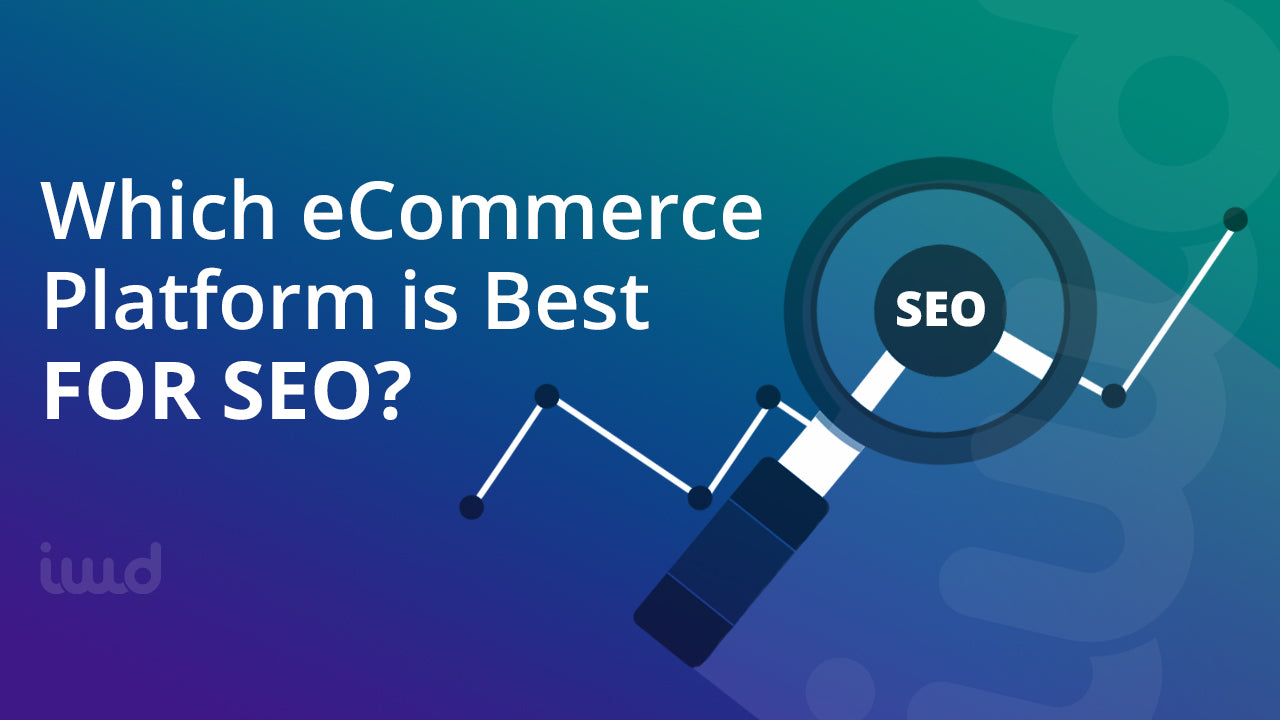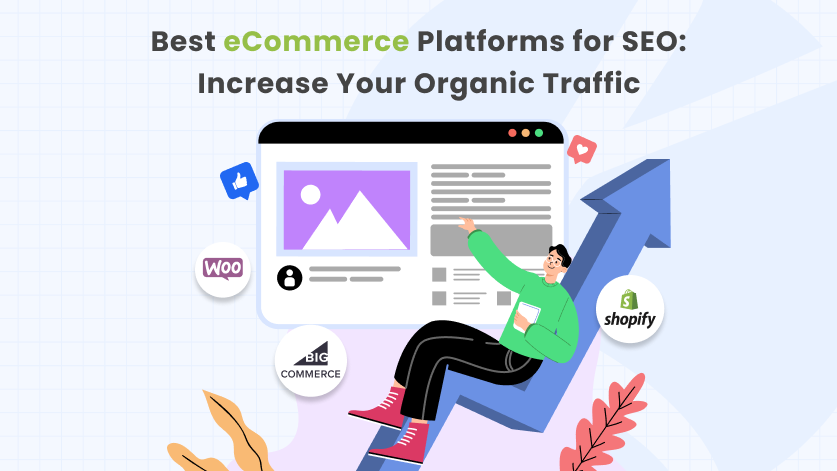Best Ecommerce Platform for SEO: Boost Your Online Sales
Shopify and WooCommerce are often considered the best eCommerce platforms for SEO. Both offer extensive SEO features and flexibility.
Choosing the right eCommerce platform is crucial for your online store’s success. Good SEO capabilities can significantly impact your site’s visibility and search engine rankings. Shopify is known for its user-friendly interface and robust SEO tools, making it ideal for beginners.
WooCommerce, a WordPress plugin, offers deep customization and flexibility, perfect for those with more technical knowledge. Both platforms provide essential SEO features like customizable URLs, meta tags, and mobile optimization. Evaluating your specific needs and technical skills can help you decide which platform is better suited for your business.

Credit: www.ezrankings.com
Introduction To Ecommerce And SEO
Ecommerce is selling products online. SEO is optimizing your site for search engines. Combining both is crucial for success. SEO helps your ecommerce site rank higher. This attracts more visitors and potential customers. Understanding ecommerce and SEO is essential for online growth.
Importance Of SEO In Ecommerce
SEO in ecommerce brings organic traffic to your site. Search engines like Google prioritize SEO-optimized sites. Higher rankings mean more visibility. Visibility leads to increased traffic and sales. An optimized ecommerce site builds trust with customers. Trust translates into higher conversion rates.
How SEO Boosts Sales
SEO boosts sales by attracting targeted traffic. Targeted traffic means people interested in your products. This increases the chances of making a sale. SEO also improves user experience. A better user experience keeps customers on your site longer. This increases the likelihood of purchases.

Credit: www.iwdagency.com
Key SEO Features In Ecommerce Platforms
Choosing the best ecommerce platform for SEO can be challenging. Key SEO features are crucial for success. These features help improve search engine visibility and user experience. Below are some essential SEO features in ecommerce platforms that make a significant impact.
Mobile Optimization
Mobile optimization is critical in today’s ecommerce landscape. Search engines prioritize mobile-friendly websites. Ensure your ecommerce platform supports responsive design. This feature adjusts the site layout for different devices. Mobile optimization also improves user experience and page load speed. Both are important ranking factors in search engine algorithms.
User-friendly URLs
User-friendly URLs make a big difference in SEO. They are easy to read and understand. A good ecommerce platform allows you to create clean URLs. These URLs should include relevant keywords. Avoid long strings of numbers and letters. Clean URLs improve click-through rates and search engine rankings.
Top Ecommerce Platforms For SEO
Choosing the right ecommerce platform is crucial for your online store. An SEO-friendly platform helps your site rank higher in search results. Here are the top ecommerce platforms for SEO.
Shopify
Shopify is a popular choice for many online businesses. It offers easy-to-use tools that help improve your SEO. Shopify provides:
- Customizable title tags
- Meta descriptions
- SEO-friendly URLs
- Built-in blog
Shopify also has a large app store. You can find many SEO plugins and tools there. This helps you optimize your store even more.
Woocommerce
WooCommerce is a powerful plugin for WordPress. It turns your site into a fully functional online store. WooCommerce is known for its SEO capabilities. With WooCommerce, you get:
- Complete control over your website
- Customizable permalinks
- Optimized images and product pages
- Seamless integration with SEO plugins
WooCommerce benefits from the flexibility of WordPress. This means you can fine-tune every aspect of your store’s SEO.
Shopify SEO Capabilities
Shopify is a top choice for online stores. It offers powerful SEO tools. These tools help boost your search engine rankings. Let’s explore the main features.
Built-in Seo Tools
Shopify provides many built-in SEO tools. These tools simplify the optimization process. Here are some key features:
- Customizable Title Tags: You can edit title tags for each page.
- Meta Descriptions: Add unique meta descriptions to attract clicks.
- URL Structure: Shopify offers clean and readable URLs.
- Image Alt Text: Easily add alt text to all images.
App Integrations
Shopify has a wide range of SEO apps. These apps extend Shopify’s capabilities. Here are some popular choices:
| App Name | Features |
|---|---|
| Plug in SEO | Checks SEO issues, and offers fixes. |
| SEO Manager | Provides detailed SEO data, and easy optimizations. |
| Smart SEO | Automates many SEO tasks, and saves time. |
These integrations make Shopify a powerful SEO platform. Use them to improve your store’s visibility.
Woocommerce SEO Strengths
WooCommerce is a popular choice for online stores. It’s built on WordPress and offers strong SEO features. This makes it an excellent option for boosting your site’s visibility.
WordPress Integration
WooCommerce is a plugin for WordPress. This gives it a head start in SEO. WordPress is known for its SEO-friendly structure. It allows you to create clean and readable URLs. You can also easily add meta tags and keywords.
WordPress supports responsive design. This ensures your site looks good on all devices. Google favors mobile-friendly sites, so this is a big plus.
Another benefit is the content management system. You can easily update your site with new content. Fresh content is crucial for SEO.
Seo Plugins
WooCommerce works well with many SEO plugins. These plugins help you optimize your site further. Here are some popular ones:
- Yoast SEO: Helps with on-page SEO. It offers suggestions to improve your content.
- All in One SEO Pack: Another great tool. It provides features like XML sitemap support.
- Rank Math: Known for its user-friendly interface. It offers advanced SEO features.
These plugins make it easy to add meta descriptions, title tags, and alt text for images. They also help with keyword optimization. This ensures your content is targeted and relevant.
Using these plugins, you can also track your site’s performance. They offer insights and analytics to help you improve.
In summary, WooCommerce’s integration with WordPress and SEO plugins provides a strong foundation for SEO.

Credit: www.cirklestudio.co
Comparing Seo Features
Choosing the best ecommerce platform for SEO can be challenging. Each platform offers unique SEO features. This section will compare the SEO features of popular ecommerce platforms.
Customizability
Customizability is crucial for SEO success. You need to tailor your website to your SEO strategy. Here is a comparison of customizability features:
| Platform | URL Structure | Meta Tags | Schema Markup |
|---|---|---|---|
| Shopify | Limited | Fully Customizable | Supports Plugins |
| WooCommerce | Fully Customizable | Fully Customizable | Supports Plugins |
| BigCommerce | Limited | Fully Customizable | Built-in Options |
Ease Of Use
Ease of use impacts how quickly you can optimize your site. Here is a comparison of ease of use:
- Shopify: User-friendly interface, but limited in advanced SEO features.
- WooCommerce: Flexible but requires technical knowledge.
- BigCommerce: Balanced between ease of use and advanced options.
Evaluate your needs before choosing a platform. Customizability and ease of use are key factors for SEO.
Seo Best Practices For Ecommerce
Ensuring your ecommerce site is optimized for search engines is crucial. This can drive organic traffic and increase sales. Implementing SEO best practices can help your site rank higher. Here, we will cover two essential strategies: Keyword Research and Content Marketing.
Keyword Research
Keyword research is the foundation of any successful SEO strategy. You need to find the terms your customers are searching for. This will help your site appear in relevant search results.
- Use tools like Google Keyword Planner.
- Focus on long-tail keywords.
- Analyze competitors’ keywords.
Long-tail keywords are specific phrases. They usually have lower competition. For instance, “red running shoes for kids” is a long-tail keyword. This is more specific than just “shoes.”
Competitor analysis can reveal valuable keywords. Check what terms your competitors rank for. This can give you ideas for your own keyword strategy.
Content Marketing
Content marketing is another essential SEO practice. Quality content can attract visitors and keep them engaged. This helps improve your search rankings.
- Create informative blog posts.
- Use product descriptions effectively.
- Include customer reviews and testimonials.
Blog posts are a great way to target specific keywords. Write about topics that interest your customers. This can drive traffic and improve your site’s authority.
Product descriptions should be unique and detailed. Avoid using manufacturer descriptions. They are often duplicated across many sites. Instead, write your own engaging descriptions.
Customer reviews add credibility to your site. Encourage customers to leave reviews. This can increase trust and improve rankings.
| SEO Practice | Benefits |
|---|---|
| Keyword Research | Find relevant search terms, low competition, and high relevance. |
| Content Marketing | Engage visitors, improve site authority, and increase trust. |
Choosing The Right Platform
Choosing the right ecommerce platform is crucial for your SEO success. Different platforms offer various features that can impact your site’s visibility on search engines. This section guides you through selecting the best platform by considering your business needs and budget.
Business Needs
Your business needs should drive your choice of ecommerce platform. Consider the size of your product catalog. Large catalogs need platforms with robust inventory management. Think about the level of customization you require. Some platforms offer more flexibility than others.
Evaluate the ease of use. If you or your team are not tech-savvy, a user-friendly interface is essential. Look for platforms that offer excellent customer support. This can help resolve issues quickly, minimizing downtime.
Additionally, consider the built-in SEO features. Some platforms have advanced SEO tools that make it easier to optimize your site. Features like customizable URLs, meta tags, and alt attributes are vital for SEO.
Budget Considerations
Your budget plays a significant role in your platform choice. Some platforms charge a flat monthly fee, while others take a percentage of your sales. Make sure to calculate all potential costs, including transaction fees, add-ons, and plugins.
Free platforms may seem attractive but often lack advanced features. Investing in a paid platform could save you money in the long run. Paid platforms usually offer better security and support.
Here’s a quick comparison table to help you:
| Platform | Cost | SEO Features | Support |
|---|---|---|---|
| Shopify | From $29/month | Excellent | 24/7 Support |
| WooCommerce | Free + Hosting | Good | Community Support |
| BigCommerce | From $29.95/month | Excellent | 24/7 Support |
Ensure your chosen platform aligns with your budget and business needs. The right platform will provide a balance of cost and features, optimizing your ecommerce SEO efforts.
Frequently Asked Questions
What Is The Best Ecommerce Platform For SEO?
The best ecommerce platform for SEO is often Shopify. It offers robust SEO features. These include customizable title tags, meta descriptions, and URL structures. Shopify also has excellent mobile optimization.
Does Shopify Offer Good SEO Features?
Yes, Shopify offers excellent SEO features. These include customizable meta tags, URL structures, and sitemaps. It also has great mobile optimization. Additionally, Shopify supports SSL certificates, which are crucial for SEO.
Is Woocommerce Good For SEO?
Yes, WooCommerce is good for SEO. It offers customizable meta tags and URLs. WooCommerce is built on WordPress, known for its SEO capabilities. Plugins like Yoast SEO can enhance WooCommerce SEO.
How Does Mobile Optimization Affect SEO?
Mobile optimization significantly affects SEO. Search engines prioritize mobile-friendly websites. Mobile optimization improves user experience and reduces bounce rates. Platforms like Shopify are excellent for mobile SEO.
Conclusion
Choosing the best ecommerce platform for SEO can boost your online visibility. Focus on features that enhance search rankings. Consider factors like site speed, mobile optimization, and user experience. A strong SEO-friendly platform can drive traffic and increase sales. Make an informed decision to ensure your ecommerce success.





